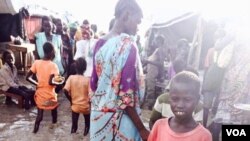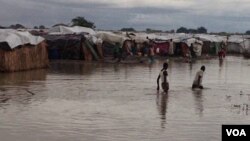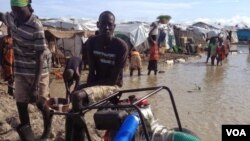Every day, the first thing residents of a protection site at the U.N. base in Bentiu do when they wake up is grab buckets and bowls to bail out water from their submerged homes.
But it’s not really accurate to call it water. It’s more a greenish-brown sludge, mixed with garbage and human waste, which has flooded the camp housing 47,000 displaced people, wiping out schools and cutting off access to health services for an already vulnerable population.
There are few dry spots to be found. Residents trudge through the muck, sometimes up to their waists, to fetch firewood or reach a surprisingly vibrant market, where vendors have set up stands in the water — or slightly elevated over the mud — to sell basic items: sorghum, some meat, flip-flops.
“Welcome to Bentiu paradise!” a grinning shopkeeper shouts through the clamor of the marketplace.
Behind the shops, a woman named Miteresa shares two beds with her eight children. The floor of their living space is made of a thick, sticky mud. Outside, some of her boys are trying to repair a small wall that keeps a surrounding lake of water from cascading into their home.
“We are struggling,” she says. “The place is filled with water and the children cry from standing up all day with no place to sit down.”
Escape from Bentiu
Life was hard enough before the rains, which started around July and picked up in the last few weeks.
Bentiu, the capital of oil-rich Unity State in South Sudan, has been the most contested area in the 10-month conflict between government forces loyal to President Salva Kiir and the armed opposition under the leadership of his former deputy, Riek Machar.
Most of those displaced are from Machar’s Nuer tribe, while the government soldiers who have retaken control of the town, are mostly Dinka, same as President Kiir.
The town has been the scene of some of the worst atrocities during the fighting, including ethnically targeted killings committed by both sides, according to human rights groups.
In April, rebels were accused of killing hundreds of civilians who had taken refuge inside a mosque and a church in the city, though the opposition leadership denied responsibility.
The medical aid group Doctors Without Borders said their main hospital in Bentiu was ransacked and patients were shot in their beds.
During this time, the population at the Bentiu base exploded, as panicked residents sought protection from peacekeepers based there. Starting in mid-April, the size of the protection site increased from around seven-thousand to over 20,000 by the end of the month.
Yoannis Bith was part of the surge. He says while conditions are bad in the camps, he is still too afraid to leave.
“You don’t go outside because of the security problem,” he says. “Those government troops, they want some of the people from the camps just only to kill them, there’s no more explanation. That is why people are staying here.”
Water, the Enemy
The base was never meant to house displaced people, but aid agencies have responded to the crisis by delivering food and providing health care and other basic services.
But now the most pressing challenge is water, and NGOs have refocused on draining the camps.
Gas-powered pumps run day and night to push water into the marshland outside the camps, while excavators build mud walls to keep it from rushing back in.
Efforts are also underway to construct a two-kilometer long drainage ditch to move water to a nearby river.
“All of the agencies together are trying to build a big drainage to drain the water out, this is not enough,” says Ainga Razafy, the head of the Unity State field office for the U.N. children’s agency UNICEF.
Razafy says it will take weeks to remove water from areas where people are living.
And while the rainy season has created this dire situation, there are concerns that the coming dry season, with an expected uptick in fighting, could spell further trouble.
Until security improves, the population is likely to stay high in the camps, despite the challenges.
“We need peace,” says Gai, a 14-year old who was separated from his family and is now living in the camps with other boys who are on their own.
“When there is peace, we will not stay here," he says. "We will go.”








